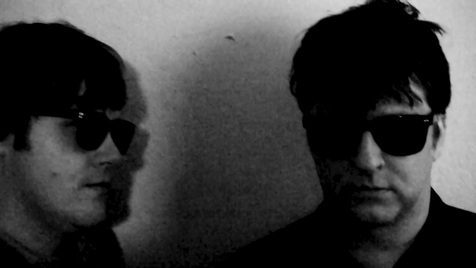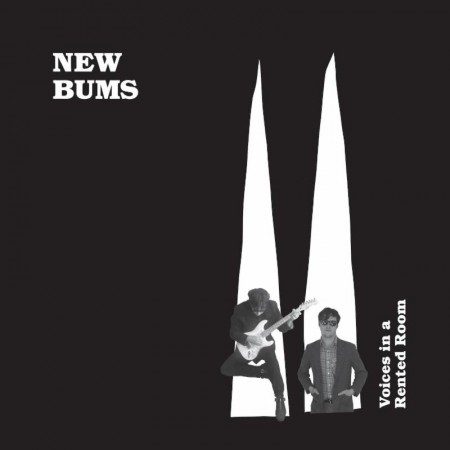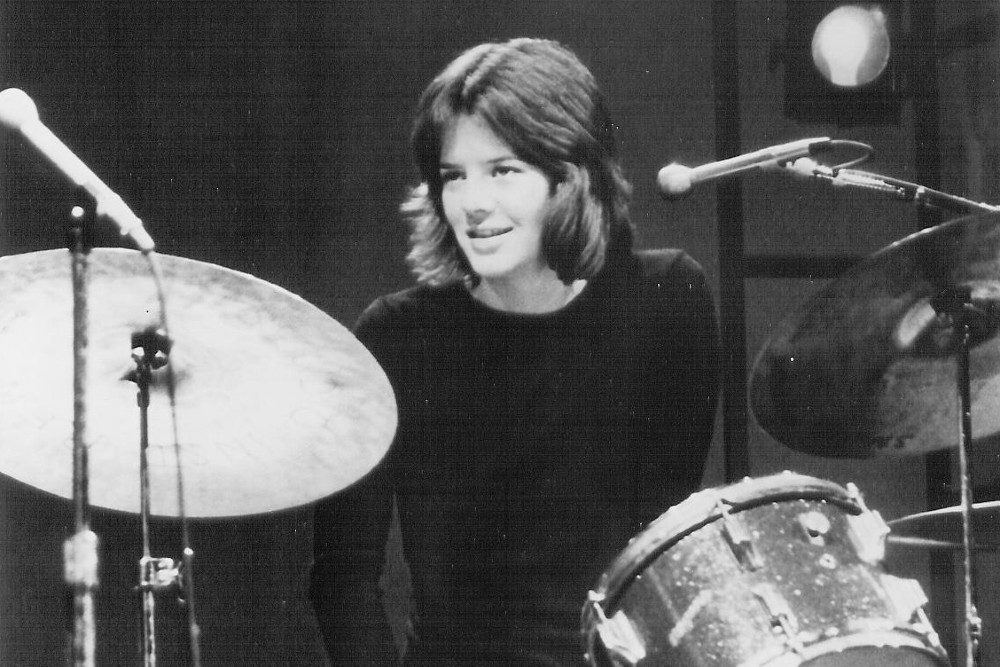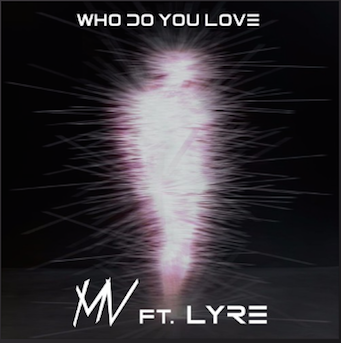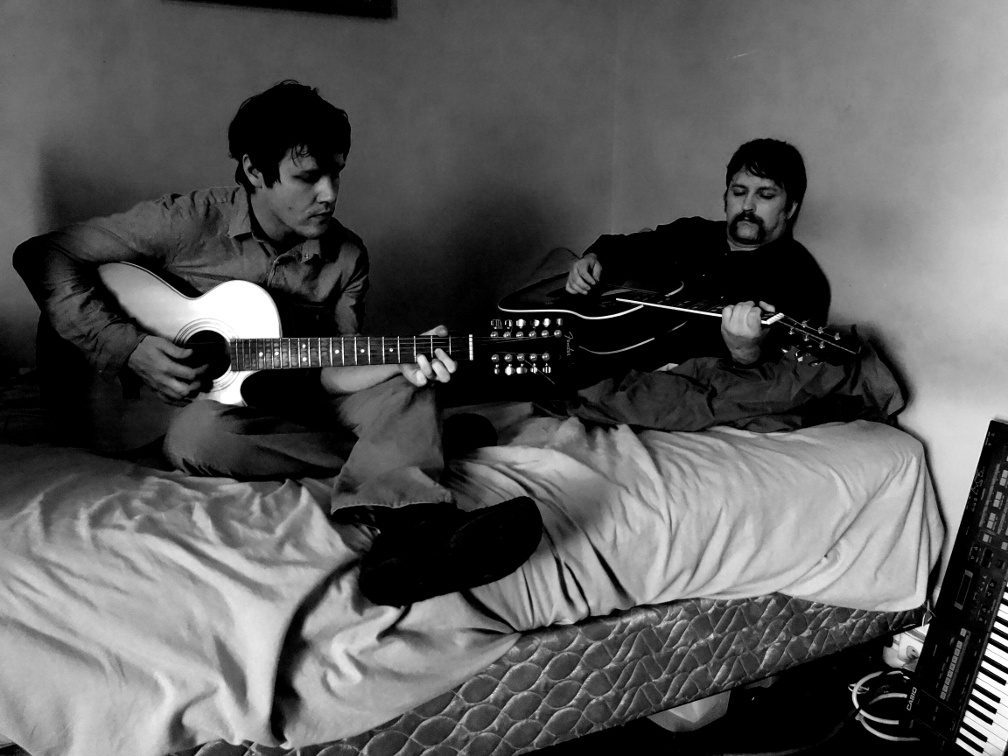
Although Ben Chasny and Donovan Quinn’s initial dislike for each other when they met, a few years ago, was personal–not musical–it’s tempting to talk about, because their work together now is so dependent on their bond. They always liked each other’s music (Quinn released albums with Skygreen Leopards, Chasny with Six Organs of Admittance, Rangda, and Comets on fire, to name a few). When the pair formed New Bums, they entered into a collaboration that uniquely fused each member’s skill set into a partnership that couldn’t be broken in half. On their debut album together, Voices in a Rented Room, the group wears its intent on its sleeve: Quinn’s trademark folky lyric imagery seems to be emitting simultaneously and from the same point of origin as Chasny’s delicate instrumental ramblings.
The low-lit, husky vocals of the first song on Voices, “Black Bough,” immediately conjures a backdrop of moodiness and melancholy, and that aura stays strong throughout the album’s twelve tracks. Acoustic guitar-based melodies, bearing tight-knit likenesses to their lyrical counterparts, emerge over this backdrop, waxing and waning as the songs wear on. It’s dark, sparsely-laid stuff, with lots of chilly backup oohs and ahhs, that also brings some catchy phrasings–like the ones on “The Killers and Me”–that have kind of an old-time cowpoke feel. “The longest train I ever saw..” one line begins on “Town on the Water,” in un-showy evocation of the traditional–and great–“In The Pines.” In other spots, too, New Bums tip a quiet salute to Old, Weird America with ragged vocals and guitars that trill like mandolins. The band side-steps a direct descendant-ness from American folk, though, with switched-up rhythmic weight and a modern approach to lyrical metaphor. Though the music emerges from a couple different songwriting traditions, New Bums’ tracks are too interior, and too personally crafted, to really resemble anything but themselves. The influences are visible, but none will smack you over the head.
Separately, Chasny and Quinn have been associated with the new folk and acoustic-leaning psychedelic schools of music-making. This project’s most apparent deviation from their other lives as musicians is how dialed down the impulse to push into new, extreme turf feels on Voices. The music demands attention the way a whisper makes you quiet down to hear it. “I don’t know if anyone will notice it or care about it, but I like it because it’s sweet,” Quinn told AudioFemme last week, explaining “Town on the Water” is one of his favorite tracks off the new album. A lot of the songs on Voices, sweet or not, are like that, quiet enough to slip by unnoticed. Whether sighing like a woodsier, and slightly less devastated, Elliott Smith on “Mother’s Favorite Hated Son” or tracing the feathery, high-register melodies of “Black Bough,” Quinn and Chasny’s vocals yield more the more–and the closer–you listen to them. If you like your folk low and slow, your guitars sweet and your lyrics bleak, try Voices in a Rented Room on for size. The album’s out February 18th on Drag City. Check out the music video for “The Killers and Me” below:
Last week, I called up New Bums to talk about the recording of Voices and get some insight into their collaboration process. Turns out, there’s a mystery man named Willem Jones behind the duo, and he started it all–even directing the video you see above. The story of their initial dislike for each other became even funnier when, since the two band members were in different parts of California and I kept losing one or the other’s line when I tried to put them on conference call, they started ragging on each other like Jewish mothers. “I don’t think he has service,” Quinn said first. “Let me give you another number. Once Chasny was on the phone, Quinn dropped out. “He has a land line,” Chasny insisted. “Ask him why he isn’t using his landline.” The pair had clearly overcome their differences, and then some. Read on to discover how New Bums write their songs, where they got their name, and which of them is secretly a malevolent space alien just biding his time before pursuing world domination.
AF: We’ve heard your band is a “grudging match-up.” How did you guys meet?
Donovan Quinn: We had a mutual friend named Willem Jones and he brought us together. At first we didn’t get along for various reasons, but over time we started talking about music and different writers and found that we had a lot in common, but there are also a lot of differences to our approach. I’ve always been a fan of Ben’s music. I just jumped at the opportunity to work with him.
Ben Chasny: We had crossed paths at festivals before we started hanging out with Willem, and I think [fusion_builder_container hundred_percent=”yes” overflow=”visible”][fusion_builder_row][fusion_builder_column type=”1_1″ background_position=”left top” background_color=”” border_size=”” border_color=”” border_style=”solid” spacing=”yes” background_image=”” background_repeat=”no-repeat” padding=”” margin_top=”0px” margin_bottom=”0px” class=”” id=”” animation_type=”” animation_speed=”0.3″ animation_direction=”left” hide_on_mobile=”no” center_content=”no” min_height=”none”][Quinn] had a dislike for me from then. Apparently we had already met once, and then I ran into him while I was at Amoeba Records shopping, and he tells me that he came up to me and I didn’t recognize him. So he got offended and wrote me off forever.
AF: So you just got off on the wrong foot? Your differences were always personal, not musical?
DQ: Yeah, I think Ben is easily one of the best guitar players in the world. He’s a shredder. But he’s also a great songwriter, and songwriting has always been my main interest. We tried to make that the focal point of the group—as opposed to the other projects we’ve each been a part of—so we always try to start a song by having the lyrics and melody together, and then work from that.
AF: You guys are both veterans, you’ve each been involved in a bunch of different collaborations.
DQ: Yeah, we’re old. We’ve both been around for a long time and have done a lot of music. When we got together and decided we wanted to start New Bums, we really wanted to come up with an idea and an aesthetic that we hadn’t done before, that would be its own thing. We do benefit from having done different albums, been involved with different bands, but it was important to make sure we were doing something new with this project.
BC: An interesting thing I’ve noticed throughout the years, is when two people get together to collaborate, they kind of always want to do what the other person is doing. So if you have some guy—not me, but if I take this out of my perspective—who was doing a lot of heavy metal, and he got together with someone who was doing dance music, the heavy metal guy would start wanting to do dance music and the dance guy would be like, ‘Oh, no, I want to do what you’re doing!’ That’s what always happens to me when I collaborate. With Donovan, it was apparent pretty immediately that there was a certain middle ground we were going for. I mean, what we do separately isn’t so different in the first place.
AF: Where does the name New Bums come from?
DQ: I don’t know if Ben will remember this differently, but that’s another Willem Jones thing. We would get together at his parties, and we were the only people there under sixty years old, and we were called the new bums. It just stuck. I really like the name. I don’t know if it’s the best name, but for better or worse, we just became the New Bums.
BC: It came to the point where we’d try to come up with other names. When we tried to do that, nothing else made sense, because that’s what those guys were calling us. We don’t see each other that way, but we thought it was funny.
DQ: It’s really a partnership. We wanted to have a band where, with anything we put out, we couldn’t do it without the other person. Especially because now, if you meet a band, every single person in the band has their own thing, too. They’ll play drums, or whatever, but also have their own project. We wanted to try to get away from that auteur thing and have it really be truly collaborative.
AF: Do you write songs totally collaboratively?
DQ: Usually, one of us will have an idea, and then try not to develop it too much, so that the other person can have some input. It might just be a chord change or a couple of lines, a lyric idea, and then the other person will just jump on. An example would be “Your Girlfriend Might Be A Cop,” I started with the idea of hanging out with a new friend and getting the crazy paranoid idea that this new friend of yours actually might be a cop who’s gonna turn you in. Ben saw that in a notebook of mine and came up with a melody around it. He came up with this idea of the unreliable narrator, and it being somebody’s girlfriend. That’d be an example of how we would work—somebody comes up with an idea, the other one rearranges it, and it goes back and forth.
BC: Donovan’s really lyric-oriented, and I’m more driven by chords and music. He doesn’t work on chords as much, and I definitely don’t work on words as much. But it’s funny, on the record, the songs came in every different way. Some songs he wrote all the lyrics, some songs I wrote all the lyrics, on some songs the verses are half mine and half his. The music is written mostly by one person, though. Every song seems like it was created in a different way. Which is pretty exciting. We don’t have a template.
AF: Is that an example of what you were talking about before, about picking up on what the other person in your group is doing and wanting to get into that?
BC: Yeah. That’s the reason why I’m in this band. I’m in a bunch of bands, doing different things, but the reason why I’m in this band is because of the word stuff. This is my band to work on lyrics. Also, to have a good time.
AF: Even if you did get off to a bad start, you seem to have gotten very close. Is the music you’ve made a byproduct of your friendship?
BC: Yeah, I moved away from San Francisco for a while, and we would use the band as an excuse to get together. He’d say, ‘I’ll fly up to Seattle,’ where I was living at the time, ‘We’ll finish this record!’ And he’d come up and we wouldn’t even work on it, we’d just hang out. In that way, the band was more of a vehicle for friendship, but now we’re doing it more seriously.
DQ: Like I said, I was a fan of Ben’s. I think he has a great aesthetic and a great mind for music. We’d go to the bar and talk about Townes Van Zandt for hours. I just get excited about working with someone I can see eye to eye with, and who also has ideas I never would have. Even if there was no record, or shows, we would still have become New Bums and it would have been a secret band for our own enjoyment.
AF: It sounds like a really fun and easy experience for you, making music right now.
DQ: Our idea of fun may be different than some peoples’. Both me and Ben—we aren’t known for, uh, a relaxed demeanor when it comes to music. We’re both liable to have a total meltdown during any given moment at a show, but it does help to have somebody with you who you can kind of rely upon. It is really fun. Ben says that it’s kind of like a buddy film. We try not to be ever at all lazy with the music—have space and all that, yes, but we also take a lot of time to make sure that we can listen back to a song a thousand times and there’s not something in there that we think is shitty.
AF: How did that come through on your new album, Voices From A Rented Room? What were your goals for the record?
DQ: Every step of the way, the way we came up with the songs was a product of all these ideas and dreams we had and that we had talked about for years. We tried to get the feeling of the two of us in a room playing the song together, very loose and late-night feeling. I feel that a lot of new music is really built up. Whether it’s pop, or heavy music, or whatever, it’s really pushed up to ten—armored, in a way. I think that’s because it’s hard to get attention in the music world, because there’s so much music, and so many ways to hear it, that people really want to immediately make a big impression. We kind of want the opposite of that. We want to come across naturally, the way we would if you were in the room listening to us come up with the songs and jam.
BC: I was just happy to have songs with more of a narrative—an apparent narrative—as opposed to the kind of material I usually work with, which has more of a hidden narrative and fewer words. I think if New Bums has any philosophy, it’s just…um, to record songs ourselves and not spend a lot of money. True to our name. We tried not to be very extravagant, and at the same time, we wanted to take a lot of care and pay a lot of attention. I don’t know that we have a philosophy beyond that. If we do, it’s still in the works.
AF: The first track “Black Bough,” which you’ve released already, feels very pared down and sparse.
DQ: That was the first song that we wrote for the project. After we came up with “Black Bough,” it gave us a lot of confidence to go forward with the band. That song, maybe more than any other on the album, has all the ideas that we wanted to get across with the band. It’s sparse, and has a lot of space, which we always enjoy. It’s got the kind of space you hear in seventies outlaw country music, and early hip hop, too, where the beats are really spacious.
AF: What was the process of recording that song like?
BC: We were just trying to figure each other out, at that time. We lived really close to each other, and he would come over late at night. He had that song, and I remember just playing it my garage, because I was lucky enough to have a garage in San Francisco at that time. I remember drinking a lot, and not remembering how to play the song. It was a pretty fun song.
AF: It’s funny you should say that, because the song—and the whole album—also seems very melancholy. Do you both prefer darker stuff?
DQ: Yeah, me and Ben have that in common. We tend to do dark music. Different people have different things that make them want to write, and usually I write when I’m looking back on something. I write a lot of songs about relationships—romantic, family, friendships—but the point of view I find it easiest to write from is when it’s over, and you’re looking back on it, which is inherently sad. So that leads me into darker territory more often than not.
AF: What’s your favorite song on the album?
DQ: I have a couple. I really love “Your Girlfriend Might Be A Cop” and “Black Bough.” “Town on the Water” is kind of a band favorite. It’s one of those songs where I don’t know if anyone will notice it or care about it, but I like it because it’s sweet. It’s a kind-hearted song, which is hard for our band to write. We’re better at the dour, shattered songs. “Town on the Water” is about combing your hair to go out on a date, dancing in the hallway and stuff. I was really excited to have a song like that, that I thought my mom would like. In fact, Chasny gave his father the album and he said that was his favorite song. We were pretty excited about that.
AF: Earlier, Donovan, you mentioned that Ben kind of thinks of your band as a buddy film. If we were watching “New Bums” The Movie, how would that buddy film end?
BC: Well, I would hope it would be a sci-fi buddy film. Donovan would definitely end up being an alien. Or one of us would, at least—much to the surprise of the other one. Not a nice alien. A real mean alien. But an alien that wouldn’t harm the other band member. It would be like—oh wow, here is this creature that’s usually really mean, but it’s been nice to me this whole time.
AF: So Donovan the Alien would wreak havoc on the world, and then spare you?
BC: Maaaaybe. It would be a big question mark. Just like The Thing, at the end. Would I actually be spared, or not? In fact I think there’s a good chance that that’s actually how the band is gonna end. Maybe without the alien part.
AF: Well, that leaves room for a sequel.
BC: Precisely. A big question mark.
Many thanks to Ben Chasny and Donovan Quinn for entertaining our questions! Once again, Voices in a Rented Room is out 2/18/14 via Drag City; you can pick up your copy and learn more about the Bums here. Listen to “Black Bough,” the first track off the album, via SoundCloud:
[/fusion_builder_column][/fusion_builder_row][/fusion_builder_container]

